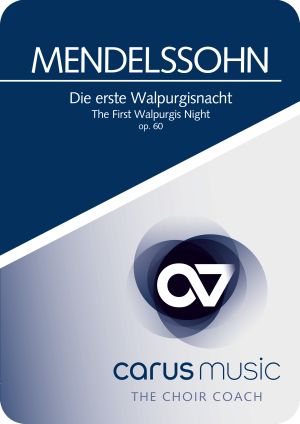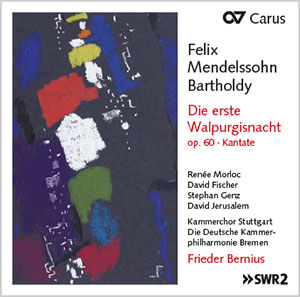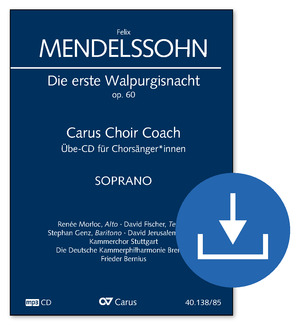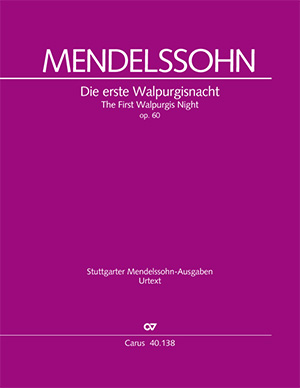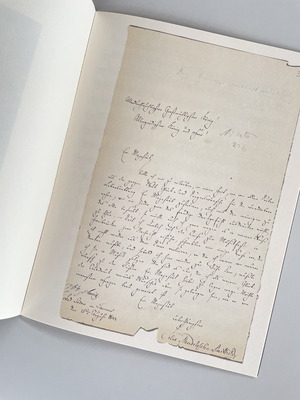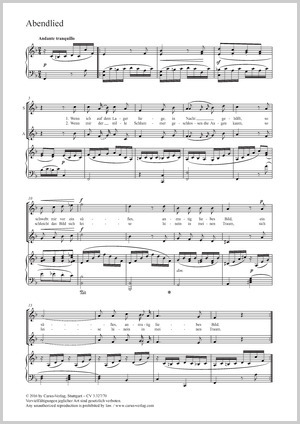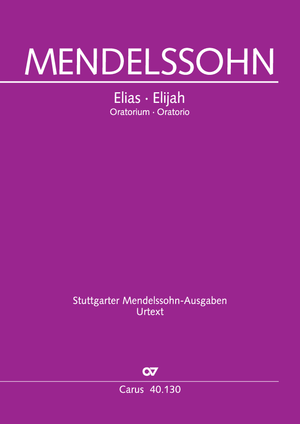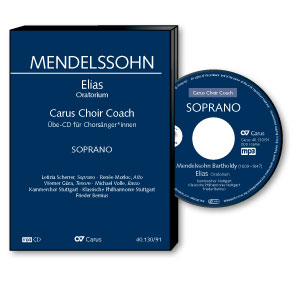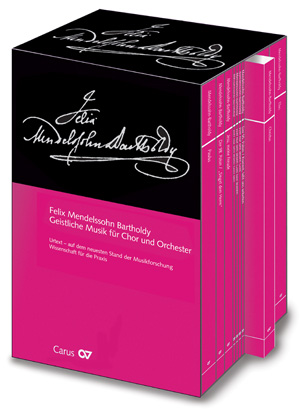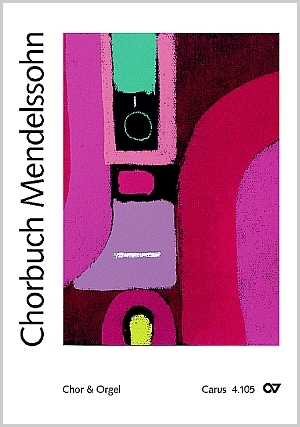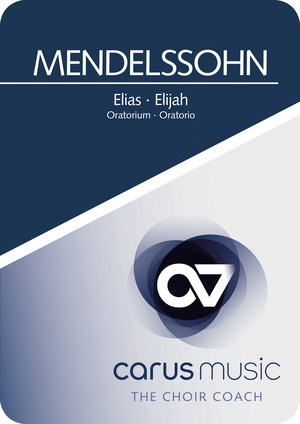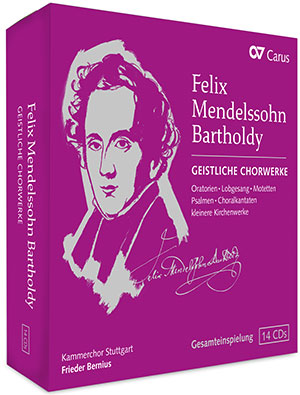Felix Mendelssohn Bartholdy The First Walpurgis Night
Ballad for chorus and orchestra MWV D3 (Op. 60), 1833
- Scoring:
- Soli ATBarB (ATB), Coro SATB, Pic, 2 Fl, 2 Ob, 2 Clt, 2 Fg, 2 Cor, 2 Tr, 3 Trb, Timp, Gran Tamburo e Piatti, 2 Vl, Va, Vc, Cb
- Search for works with similar scoring
- Language:
- German/English
- Duration:
- 36 min
- Difficulty level:
- 1 2 3 4 5
- Text source:
- Nach der Ballade "Die erste Walpurgisnacht" von J. W. von Goethe
Goethe’s dramatic ballad The First Walpurgis Night inspired Mendelssohn to write a magnificent and vivid portrayal of the conflict between an old heathen community and the new aspirations of Christianization, between belief and superstition on both sides. In 1833 Mendelssohn had his ballad premiered, but he decided to make far-reaching revisions before he finally had the work published in 1844.
Goethe's text is not without its challenges for the singers, especially in the chorus of the druid guardians "Kommt mit Zacken und mit Gabeln". If you want to take part in this wild ride, you should have practised well before the rehearsal!
Simply practice. Anytime. Everywhere.
Whether at home on your tablet or PC or on the road on your smartphone: with carus music, the Choir Coach, you always have your choral works with you to practice! With the carus music choir app, you can listen to your score together with a first-class recording on any device and easily practice your own choir part with a coach. With carus music, your concert preparation is easy, efficient and fun to master!
Performers: Renée Morloc (Soprano), David Fischer (Alto), Stephan Genz (Tenore), David Jerusalem (Basso) – Kammerchor Stuttgart – Die Deutsche Kammerphilharmonie Bremen – Frieder Bernius
 Listen
(11)
Listen
(11)
- Ouvertüre, I. Das schlechte Wetter
- Ouvertüre, II. Der Übergang zum Frühling
- Es lacht der Mai
- Könnt ihr so verwegen handeln
- Wer Opfer heut zu bringen scheut
- Verteilt euch, wackre Männer
- Diese dumpfen Pfaffenchristen
- Kommt mit Zacken und mit Gabeln
- So weit gebracht
- Hilf, ach, hilf mir
- Die Flamme reinigt sich vom Rauch
 Practise
Practise
-
-
Practice aids voice part soprano
- Es lacht der Mai (Choir Coach, soprano 1)
- Es lacht der Mai (Choir Coach, Slow mode, soprano 1)
- Könnt ihr so verwegen handeln (Choir Coach, soprano 1)
- Könnt ihr so verwegen handeln (Choir Coach, Slow mode, soprano 1)
- Verteilt euch, wackre Männer (Choir Coach)
- Verteilt euch, wackre Männer (Choir Coach, Slow mode)
- Kommt mit Zacken und mit Gabeln (Choir Coach, soprano 1)
- Kommt mit Zacken und mit Gabeln (Choir Coach, Slow mode, soprano 1)
- So weit gebracht (Choir Coach)
- So weit gebracht (Choir Coach, Slow mode)
- Die Flamme reinigt sich vom Rauch (Choir Coach, soprano 1)
- Die Flamme reinigt sich vom Rauch (Choir Coach, Slow mode, soprano 1)
- Es lacht der Mai (Choir Coach, soprano 2)
- Es lacht der Mai (Choir Coach, Slow mode, soprano 2)
- Könnt ihr so verwegen handeln (Choir Coach, soprano 2)
- Könnt ihr so verwegen handeln (Choir Coach, Slow mode, soprano 2)
- Kommt mit Zacken und mit Gabeln (Choir Coach, soprano 2)
- Kommt mit Zacken und mit Gabeln (Choir Coach, Slow mode, soprano 2)
- Die Flamme reinigt sich vom Rauch (Choir Coach, soprano 2)
- Die Flamme reinigt sich vom Rauch (Choir Coach, Slow mode, soprano 2)
-
Practice aids voice part alto
- Es lacht der Mai (Choir Coach, Alto 1)
- Es lacht der Mai (Choir Coach, Slow mode, Alto 1)
- Könnt ihr so verwegen handeln (Choir Coach, Alto 1)
- Könnt ihr so verwegen handeln (Choir Coach, Slow mode, Alto 1)
- Verteilt euch, wackre Männer (Choir Coach)
- Verteilt euch, wackre Männer (Choir Coach, Slow mode)
- Kommt mit Zacken und mit Gabeln (Choir Coach, Alto 1)
- Kommt mit Zacken und mit Gabeln (Choir Coach, Slow mode, Alto 1)
- So weit gebracht (Choir Coach)
- So weit gebracht (Choir Coach, Slow mode)
- Die Flamme reinigt sich vom Rauch (Choir Coach, Alto 1)
- Die Flamme reinigt sich vom Rauch (Choir Coach, Slow mode, Alto 1)
- Es lacht der Mai (Choir Coach, Alto 2)
- Es lacht der Mai (Choir Coach, Slow mode, Alto 2)
- Könnt ihr so verwegen handeln (Choir Coach, Alto 2)
- Könnt ihr so verwegen handeln (Choir Coach, Slow mode, Alto 2)
- Kommt mit Zacken und mit Gabeln (Choir Coach, Alto 2)
- Kommt mit Zacken und mit Gabeln (Choir Coach, Slow mode, Alto 2)
- Die Flamme reinigt sich vom Rauch (Choir Coach, Alto 2)
- Die Flamme reinigt sich vom Rauch (Choir Coach, Slow mode, Alto 2)
-
Practice aids voice part tenore
- Es lacht der Mai (Choir Coach, Tenore 1)
- Es lacht der Mai (Choir Coach, Slow mode, Tenore 1)
- Wer Opfer heut zu bringen scheut (Choir Coach, Tenore 1)
- Wer Opfer heut zu bringen scheut (Choir Coach, Slow mode, Tenore 1)
- Verteilt euch, wackre Männer (Choir Coach)
- Verteilt euch, wackre Männer (Choir Coach, Slow mode)
- Diese dumpfen Pfaffenchristen (Choir Coach, Tenore 1)
- Diese dumpfen Pfaffenchristen (Choir Coach, Slow mode, Tenore 1)
- Kommt mit Zacken und mit Gabeln (Choir Coach, Tenore 1)
- Kommt mit Zacken und mit Gabeln (Choir Coach, Slow mode, Tenore 1)
- So weit gebracht (Choir Coach, Tenore 1)
- So weit gebracht (Choir Coach, Slow mode, Tenore 1)
- Hilf, ach, hilf mir (Choir Coach, Tenore 1)
- Hilf, ach, hilf mir (Choir Coach, Slow mode, Tenore 1)
- Die Flamme reinigt sich vom Rauch (Choir Coach, Tenore 1)
- Die Flamme reinigt sich vom Rauch (Choir Coach, Slow mode, Tenore 1)
- Es lacht der Mai (Choir Coach, Tenore 2)
- Es lacht der Mai (Choir Coach, Slow mode, Tenore 2)
- Wer Opfer heut zu bringen scheut (Choir Coach, Tenore 2)
- Wer Opfer heut zu bringen scheut (Choir Coach, Slow mode, Tenore 2)
- Diese dumpfen Pfaffenchristen (Choir Coach, Tenore 2)
- Diese dumpfen Pfaffenchristen (Choir Coach, Slow mode, Tenore 2)
- Hilf, ach, hilf mir (Choir Coach, Tenore 2)
- Hilf, ach, hilf mir (Choir Coach, Slow mode, Tenore 2)
- Kommt mit Zacken und mit Gabeln (Choir Coach, Tenore 2)
- Kommt mit Zacken und mit Gabeln (Choir Coach, Slow mode, Tenore 2)
- Die Flamme reinigt sich vom Rauch (Choir Coach, Tenore 2)
- Die Flamme reinigt sich vom Rauch (Choir Coach, Slow mode, Tenore 2)
- So weit gebracht (Choir Coach, Tenore 2)
- So weit gebracht (Choir Coach, Slow mode, Tenore 2)
-
Practice aids voice part basso
- Es lacht der Mai (Choir Coach, Basso 1)
- Es lacht der Mai (Choir Coach, Slow mode, Basso 1)
- Wer Opfer heut zu bringen scheut (Choir Coach, Basso 1)
- Wer Opfer heut zu bringen scheut (Choir Coach, Slow mode, Basso 1)
- Verteilt euch, wackre Männer (Choir Coach)
- Verteilt euch, wackre Männer (Choir Coach, Slow mode)
- Diese dumpfen Pfaffenchristen (Choir Coach, Basso 1)
- Diese dumpfen Pfaffenchristen (Choir Coach, Slow mode, Basso 1)
- Kommt mit Zacken und mit Gabeln (Choir Coach, Basso 1)
- Kommt mit Zacken und mit Gabeln (Choir Coach, Slow mode, Basso 1)
- So weit gebracht (Choir Coach, Basso 1)
- So weit gebracht (Choir Coach, Slow mode, Basso 1)
- Hilf, ach, hilf mir (Choir Coach, Basso 1)
- Hilf, ach, hilf mir (Choir Coach, Slow mode, Basso 1)
- Die Flamme reinigt sich vom Rauch (Choir Coach, Basso 1)
- Die Flamme reinigt sich vom Rauch (Choir Coach, Slow mode, Basso 1)
- Es lacht der Mai (Choir Coach, Basso 2)
- Es lacht der Mai (Choir Coach, Slow mode, Basso 2)
- Wer Opfer heut zu bringen scheut (Choir Coach, Basso 2)
- Wer Opfer heut zu bringen scheut (Choir Coach, Slow mode, Basso 2)
- Diese dumpfen Pfaffenchristen (Choir Coach, Basso 2)
- Diese dumpfen Pfaffenchristen (Choir Coach, Slow mode, Basso 2)
- Hilf, ach, hilf mir (Choir Coach, Basso 2)
- Hilf, ach, hilf mir (Choir Coach, Slow mode, Basso 2)
- Kommt mit Zacken und mit Gabeln (Choir Coach, Basso 2)
- Kommt mit Zacken und mit Gabeln (Choir Coach, Slow mode, Basso 2)
- Die Flamme reinigt sich vom Rauch (Choir Coach, Basso 2)
- Die Flamme reinigt sich vom Rauch (Choir Coach, Slow mode, Basso 2)
- So weit gebracht (Choir Coach, Basso 2)
- So weit gebracht (Choir Coach, Slow mode, Basso 2)
 Additional material
Additional material
- Purchase additional material as a download product.
-
 text (without music) for download, html file, Singing text, english translationhtml file, Singing text, english translation (Sample)
text (without music) for download, html file, Singing text, english translationhtml file, Singing text, english translation (Sample)Overture
(Portraying the change from Winter weather to Spring)
No. 1
A Druid and Chorus of People
Now May again
breaks Winter’s chain,
the bud and bloom are springing.
No snow is seen;
the vales are green,
the woodland choirs are singing.
Yon mountain height
is wint’ry white;
upon us we will gather, –
begin the ancient holy rite, –
praise our Almighty Father.
In sacrifice the flame shall rise!
Thus blend our hearts together!Chorus of Druids and the People
In sacrifice the flame shall rise
begin the ancient holy rite, –
praise our Almighty Father.
Away! Away!No. 2
An aged Woman of the People
Know ye not, a deed so daring
dooms us all to die despairing?
Know ye not, it is forbidden
by the edicts of our foemen?
Know ye, spies and snares are hidden,
for the sinners call’d “the heathen”?
On their ramparts they will slaughter
mother, father, son and daughter!
If detected,
naught but death can be expected.Chorus of Women
On their ramparts they will slaughter
mother, father, son and daughter!
They... -
 text (without music) for download, html file, Singing text, originalhtml file, Singing text, original (Sample)
text (without music) for download, html file, Singing text, originalhtml file, Singing text, original (Sample)Ouverture
I. Das schlechte Wetter
II. Der Übergang zum FrühlingNo. 1
Ein Druide und Chor des Volks
Es lacht der Mai!
Der Wald ist frei
von Eis und Reifgehänge.
Der Schnee ist fort;
am grünen Ort
erschallen Lustgesänge.
Ein reiner Schnee
liegt auf der Höh,
doch eilen wir nach oben,
begehn den alten heilgen Brauch,
Allvater dort zu loben.
Die Flamme lodre durch den Rauch!
So wird das Herz erhoben.Chor der Druiden und des Volks
Die Flamme lodre durch den Rauch!
Begeht den alten heilgen Brauch,
Allvater dort zu loben.
Hinauf! Hinauf!No. 2
Eine alte Frau aus dem Volke
Könnt ihr so verwegen handeln?
Wollt ihr denn zum Tode wandeln?
Kennet ihr nicht die Gesetze
unsrer harten Überwinder?
Rings gestellt sind ihre Netze
auf die Heiden, auf die Sünder.
Ach, sie schlachten auf dem Walle
unsre Väter, unsre Kinder!
Und wir alle
nahen uns gewissem Falle.Chor der Weiber
Auf des Lagers hohem Walle
schlachten sie uns unsre Kinder.
Ach die strengen Überwinder!
Und wir alle
nahen... -
 text (without music) for download, html file, Introductory text, Englishhtml file, Introductory text, English (Sample)
text (without music) for download, html file, Introductory text, Englishhtml file, Introductory text, English (Sample)Whirling Momentum
Mendelssohn’s colorful setting of Goethe’s ballad Die erste Walpurgisnacht (The First Walpurgis Night)
R. Larry Todd
Among the most consequential literary-musical relationships of the nineteenth century was Goethe’s decade-long friendship with Felix Mendelssohn Bartholdy. The prodigy was only twelve when in 1821 he accompanied his teacher, Carl Friedrich Zelter, to Weimar to meet the senescent doyen of German arts and letters. After Mendelssohn performed several of his own compositions and sight-read autographs of Mozart and Beethoven from his host’s library, Goethe shared this astonishing but reasoned evaluation: the young guest was nothing less than a "second Mozart."
Before composing Die erste Walpurgisnacht Mendelssohn had already set a few of Goethe’s poems as Lieder or part-songs, but had also dedicated the imposing Piano Quartet No. 3 in B minor Op. 3 (1825) to the poet, and, according to the composer’s elder sister, Fanny, found inspiration for the whimsical Scherzo of the Octet Op. 20 in the "Walpurgisnachtstraum" scene from Faust, Part I. But by 1825 Mendelssohn had not yet envisioned what became by far his most substantial engagement with the poet’s verses, the cantata
... -
 text (without music) for download, html file, Introductory text, Germanhtml file, Introductory text, German (Sample)
text (without music) for download, html file, Introductory text, Germanhtml file, Introductory text, German (Sample)Stürmisches Treiben
Mendelssohns farbige Vertonung von Goethes Ballade "Die erste Walpurgisnacht"
R. Larry Todd
Nicht biblisches Geschehen, sondern heidnische Riten stehen im Mittelpunkt von Mendelssohns Komposition nach einer Ballade von Goethe: Damit sie ihr alljährliches Walpurgisnacht-Ritual ungestört feiern können, inszenieren die Heiden ein buntes Spektakel, um Christen damit abzuschrecken. Goethes grotesk-humoristischer Darstellung des Konflikts gab Mendelssohn ein starkes musikalisches Gewand.
Goethes zehn Jahre andauernde Freundschaft zu Felix Mendelssohn Bartholdy gehört wohl zu den bedeutendsten, fruchtbarsten und folgenreichsten literarisch-musikalischen Verbindungen des 19. Jahrhunderts. Das Wunderkind war gerade 12 Jahre alt, als es seinen Lehrer Carl Friedrich Zelter 1821 nach Weimar begleitete, um dort den alternden Doyen der deutschen Kunst und Literatur zu treffen. Nachdem Mendelssohn einige seiner eigenen Kompositionen vorgetragen und Autographen von Mozart und Beethoven aus der Sammlung seines Gastgebers vom Blatt gespielt hatte, kam Goethe zur folgenden überraschenden, aber durchaus durchdachten Einschätzung: Der junge Gast sei nichts weniger als ein
...
Contents
-
Composer
Felix Mendelssohn Bartholdy
| 1809-1847
-
Songwriter / Librettist
Johann Wolfgang Goethe
-
Translator
William Bartholomew
| 1793-1867
Reviews on our website can only be submitted by customers with a registered user account. A check whether the rated products were actually purchased does not take place.
Frequent questions about this work
 There are no questions and answers available so far or you were unable to find an answer to your specific question about this work? Then click here and send your specific questions to our Customer Services!
There are no questions and answers available so far or you were unable to find an answer to your specific question about this work? Then click here and send your specific questions to our Customer Services!


